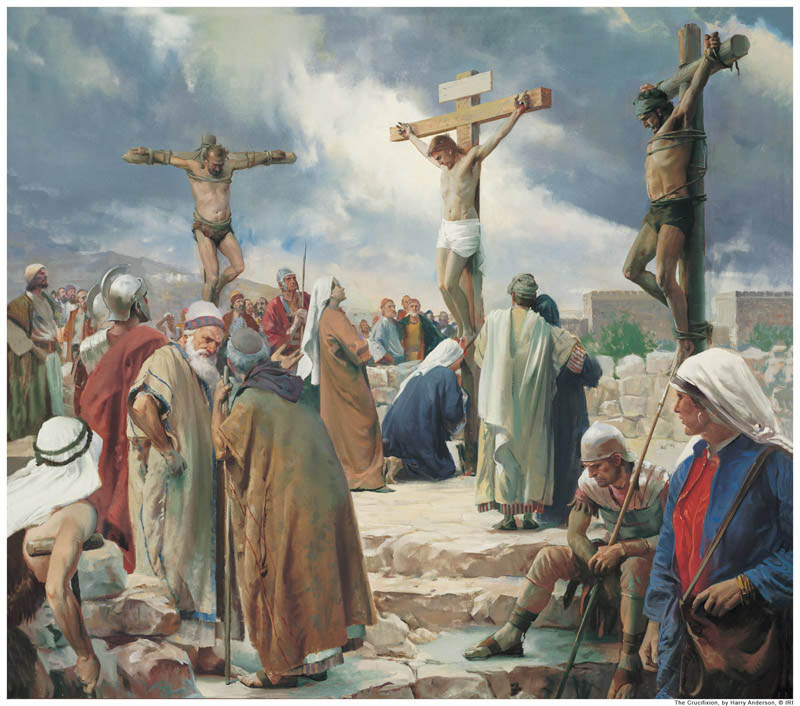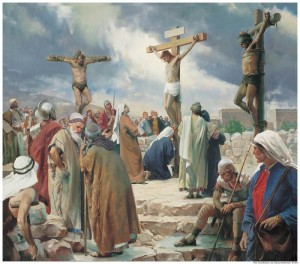Stations of the Cross is a Catholic tradition that grew out of a desire to replicate pilgrimages to Jerusalem. Today, they help Catholics remember the final days of the life of Jesus Christ as they move through a series of wooden crosses that have been blessed by a person with the authority to do so and pray. Some consider it reparation for the suffering and loneliness of the Savior’s personal Via Dolorosa. Pope Pius XI considered it an obligation for Catholics and John Paul II praised those who make an effort to stand by the endless crosses the Savior endures even today through abuse and mistreatment from those who do not honor the Sacrifices He made for them.
Although Mormons don’t participate in a formal ceremony, they do teach the principle behind it. As Pope John Paul II said, we must stand beside the Savior.
In the April 2009 General Conference of the Church of Jesus Christ of Latter-day Saints , whose members are often called Mormons, Jeffrey R. Holland gave a powerful talk on this subject, called “None Were With Him.” He spoke of how the Savior was abandoned during much of the challenging last days. He spoke of the abuse and denial not just of those who did not personally know and love Him, but also of the treatment from those within His personal circle, beginning with Judas, who knew Him, traveled with Him and taught the gospel. Peter, James, and John slept while the Savior atoned for the sins of everyone who ever had and ever would live, including those who slept outside the Garden after being asked to stay awake. In the final moments, Elder Holland wrote:“Thus, of divine necessity, the supporting circle around Jesus gets smaller and smaller and smaller, giving significance to Matthew’s words: “All the disciples [left] him, and fled.”15 Peter stayed near enough to be recognized and confronted. John stood at the foot of the cross with Jesus’s mother. Especially and always the blessed women in the Savior’s life stayed as close to Him as they could. But essentially His lonely journey back to His Father continued without comfort or companionship.”
There was a spiritual purpose to this loneliness, as Jesus came to understand completely how it felt to be alone amidst suffering. However, Elder Holland offered this plea to Christians everywhere:
“Brothers and sisters, one of the great consolations of this Easter season is that because Jesus walked such a long, lonely path utterly alone, we do not have to do so. His solitary journey brought great company for our little version of that path-the merciful care of our Father in Heaven, the unfailing companionship of this Beloved Son, the consummate gift of the Holy Ghost, angels in heaven, family members on both sides of the veil, prophets and apostles, teachers, leaders, friends. All of these and more have been given as companions for our mortal journey because of the Atonement of Jesus Christ and the Restoration of His gospel. Trumpeted from the summit of Calvary is the truth that we will never be left alone nor unaided, even if sometimes we may feel that we are. Truly the Redeemer of us all said, “I will not leave you comfortless. [My Father and] I will come to you [and abide with you].”20
My other plea at Easter time is that these scenes of Christ’s lonely sacrifice, laced with moments of denial and abandonment and, at least once, outright betrayal, must never be reenacted by us. He has walked alone once. Now, may I ask that never again will He have to confront sin without our aid and assistance, that never again will He find only unresponsive onlookers when He sees you and me along His Via Dolorosa in our present day. As we approach this holy week-Passover Thursday with its Paschal Lamb, atoning Friday with its cross, Resurrection Sunday with its empty tomb-may we declare ourselves to be more fully disciples of the Lord Jesus Christ, not in word only and not only in the flush of comfortable times but in deed and in courage and in faith, including when the path is lonely and when our cross is difficult to bear. This Easter week and always, may we stand by Jesus Christ “at all times and in all things, and in all places that [we] may be in, even until death,”21 for surely that is how He stood by us when it was unto death and when He had to stand entirely and utterly alone. In the name of Jesus Christ, amen.”
It could be said then, that Mormons carry out the Stations of the Cross every moment of every day, standing by the Savior, defending Him, serving as witnesses of Him, and making sure they give meaning to the Atonement of Jesus Christ. Their leaders teach them that ours is not a religion that can be lived only on Sundays for a few hours. It must be lived at all times in order to be meaningful.
One way Mormons stand by Jesus Christ is to set an example of Him. When we’re baptized we take on His name, and even young children, who can be baptized at age eight, are taught that this is a sacred responsibility. When we take on His name, we have a responsibility to represent what He believes as much as possible, and to make the word Christian a meaningful and positive word. We try our best never to degrade His sacred name. While no one but the Savior was ever perfect all the time, we have a responsibility beyond that of others when we call ourselves Christians.
The Lord does most of His work through other people. When someone needs to be fed, He points them out to a person who has food. When a child of God needs a home, it’s provided through inspired service of another human being. When Jesus makes us aware of another person in need, it is our responsibility to pay attention. If we look the other way, make excuses, or waste time analyzing whose responsibility it really is, we leave the Savior alone. When we study the commandments on Sunday, but forget them on Monday, we leave Him alone. When we falter and choose not to repent, we leave Him alone.
Stations of the Cross is a lovely way to remember the sacrifices Jesus made for us, strengthening their ability to do so all year. While Mormons don’t participate in this ritual, they have a sacred obligation to remember those sacrifices every day of the year, even without the reminder of ceremony.


